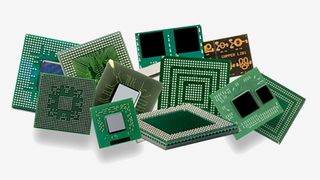Shipments of advanced processors to Russia reportedly drop 20% — Hong Kong remains a key hub for smuggling
Hong Kong remains key hub for smuggling restricted chips to Russia.

The U.S. Commerce Department revealed that this year, shipments of high-performance processors and other restricted goods from China and Hong Kong to Russia have decreased by 20%, reports Reuters. Despite this reduction, Hong Kong remains a key hub for sanctions evasion as it facilitates the flow of critical components to Russia.
Between January and May, transshipments of crucial components, known as Common High Priority Items (CHPL) through Hong Kong fell by 28%, while those through mainland China, excluding Hong Kong, dropped by 19%. This data, disclosed for the first time by a U.S. Commerce Department official, underscores the ongoing efforts to curb Russia's access to military-grade technology amid its war with Ukraine.
The decline in illicit shipments is attributed to aggressive enforcement by U.S. authorities and proactive engagement with companies whose products were being diverted to Russia. The U.S. has accused China of indirectly supporting Russia's military by providing essential parts and equipment. This accusation has led to several rounds of sanctions targeting global companies with commercial ties to Russia's defense industry, including shell companies in Hong Kong.
From August to December 2023, nearly $2 billion worth of goods were shipped from Hong Kong to Russian buyers, with $750 million being high-priority items such as advanced microelectronics, according to C4ADS, a Washington-based security nonprofit.
Texas Instruments and Intel have reiterated their commitment to complying with U.S. export regulations and sanctions. Nvidia also halted sales to Russia in March 2022 and mandated compliance with all applicable U.S. laws from its customers. However, products from Intel and Nvidia, such as Core i9 14900K and GeForce RTX 4090 for gamers, are openly available in Russia.
Furthermore, some shipments of specialized hardware have managed to reach Russia. For example, Hong Kong-based firms shipped Nvidia's Jetson TX2 systems, used in drones found on Ukrainian battlefields, to Russia. Malachor Electronics, a Hong Kong-based firm with a secretarial address in a central business district office, shipped Nvidia products worth $2.79 million to a Moscow-based company named Lotos.
Additionally, two shipments of Vectrawave chips, each worth $1 million, were sent to Russian buyers. Vectrawave produces specialized processors for communication and defense systems, including radar. Align Trading, the consigner for Vectrawave chips, operated out of a room in an industrial building near Hong Kong's Kwai Chung container port to send these products to Russia.
Stay On the Cutting Edge: Get the Tom's Hardware Newsletter
Get Tom's Hardware's best news and in-depth reviews, straight to your inbox.
The ease of establishing companies in Hong Kong has led to a proliferation of firms that enable restricted trade and monetary flows with countries like Iran, North Korea, and Russia. The Hong Kong government maintains that it enforces only United Nations Security Council sanctions and not those unilaterally imposed by other nations, complicating the enforcement of U.S. and EU restrictions.
The ongoing trade of restricted goods through Hong Kong poses a significant challenge to international security and stability. Despite the decrease in transshipments, the region continues to play a crucial role in supplying Russia with military materials.
The U.S. Commerce Department's efforts include monitoring battlefield use of transshipped goods and engaging directly with manufacturers to halt the flow of their products to Russia. This strategy aims to prevent CHPL items from reaching the Russian military, although enforcement remains challenging due to sophisticated evasion tactics employed by intermediaries.

Anton Shilov is a contributing writer at Tom’s Hardware. Over the past couple of decades, he has covered everything from CPUs and GPUs to supercomputers and from modern process technologies and latest fab tools to high-tech industry trends.
Most Popular




